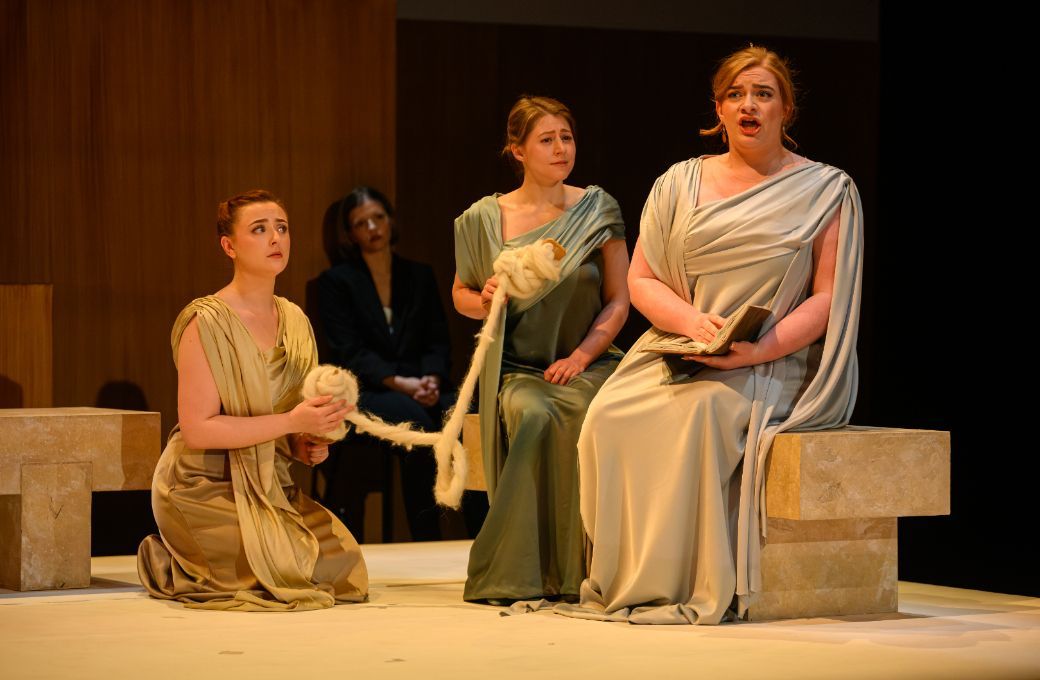It was uplifting to read in Dominic Wheeler’s introduction to the Guildhall School of Music and Drama’s Autumn Opera performance that his choice of repertoire was partly determined by the vocal identities of his charges. In programming a double bill of Smyth’s Der Wald and Respighi’s Lucrezia, he provided opportunities for a number of substantial female voices to shine in demanding music, while also giving audiences a chance to see two operatic rarities.

The London conservatoires have been giving us something of a Respighi revival in recent times. Lucrezia, completed posthumously by his widow, Elsa, is on the same subject as Britten’s The Rape of Lucretia and is derived from the same source, Obey’s Le Viol de Lucrèce. Respighi’s take makes for a fascinating comparison to Britten’s: where the latter retained Obey’s double narrator, Respighi strips these down to one – La Voce – traditionally placed in the orchestral pit and commenting throughout in a way that harks back to Athenian theatre. It’s a taut work, tightly packed in a bare hour, but the score is characteristically inventive, showing influences of Monteverdi, the Giovane Scuola and Richard Strauss, with an emotional range that commences with frenetic bonhomie and is capped by a spacious and devastating aria from Lucrezia.
Director Stephen Barlow updates the setting to a modern American courtroom, explicitly linking a sexual crime in Ancient Rome, by way of projected quotes, to contemporary crimes through the 2015 People vs Turner case. A direct association with an individual case feels unnecessarily specific when Barlow’s staging itself makes clear that sexual violence is a crime without temporal borders. Jon Morrell’s costumes blend business suits with togas to retain a Roman flavour, and the transformation of La Voce into a sharp-suited, empathetic and visibly furious prosecutor is a smart move: her narration essentially turns the opera into a combination of witness statement and scene reconstruction. At the moment of the rape, where Respighi’s music roils and seethes, a screen descends. We cannot see the crime, but a man and a woman of court staff are visible to us, and the crime is visible to them. The woman breaks down; La Voce puts an arm around her in comfort, a moment of solidarity. It’s a tightly conceived, choreographed and executed production, one of the finest I’ve seen at the Guildhall.
Vocally, it is anchored around the two principal ladies, Hannah McKay’s Lucrezia and Gabriella Giulietta Noble’s La Voce. McKay’s soprano has a richness and solidity underpinned by a budding technique; she sang with an obvious facility for breath control, with solid legato and an easy higher register. Top notes were incisive and there was a grace to her enunciation which imbued her performance with a striking dignity. Noble’s mezzo-soprano is slightly thinner and more angular; she projected well and there was a bite to her diction that showed a real sense of the text. Baritone Redmond Sanders gave us a playboy Tarquinio, showing a swaggering, thrusting voice, rich in the lower register and velvety throughout. In his final duet with Lucrezia, there was no snarl, but an audible amorality, a sense of perverse joy in his impending crime. It’s a hard colour to paint, but Sanders did it well.
Dame Ethel Smyth’s Der Wald is slightly less convincing. Wagner is the very clear musical antecedent and there is a lush, at times pastoral, flavour that neatly captures the opera’s subject. It’s harder, though, to detect any really memorable music; this did not prevent the cast from making an enjoyable case for a work that was the first by a female composer to be staged at the Metropolitan Opera.
Barlow updates the work to what looks to be the mid-20th century. Iolanthe becomes the leader of a biker gang, all leather and lust, and there is a sense of a protection racket being run. The prelude sees two graves at the front of the stage; from the outset, we are aware of a looming crisis. Barlow’s sensitive direction gives a sense of narrative flow – the finale, where Röschen prepares to hang herself, is chillingly handled. As with Lucrezia, this performance was anchored around the two principal ladies. Soprano Avery Lafrentz showed a voice with real potential in the Germanic repertoire, colouring every word with emotion and showing consistent strength in the top of the voice. It made an ideal contrast to Seohyun Go’s Röschen, demurely dressed, sung with a lighter soprano with an appealing bloom and a sense of the text. Harry Jacques, a light tenor, was a moving Heinrich, while Sonny Fielding showed a sense of the absurd as the bearskin-wearing Hausier.
In both operas, Wheeler conducted the orchestra in dynamic performances, the musicians strongest in the Respighi, with some particularly fine woodwind playing.


